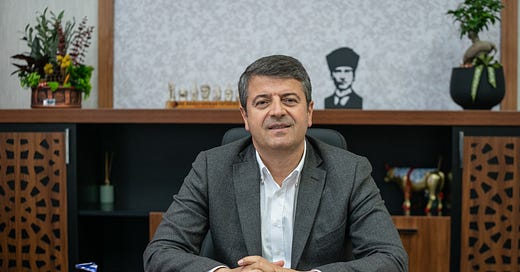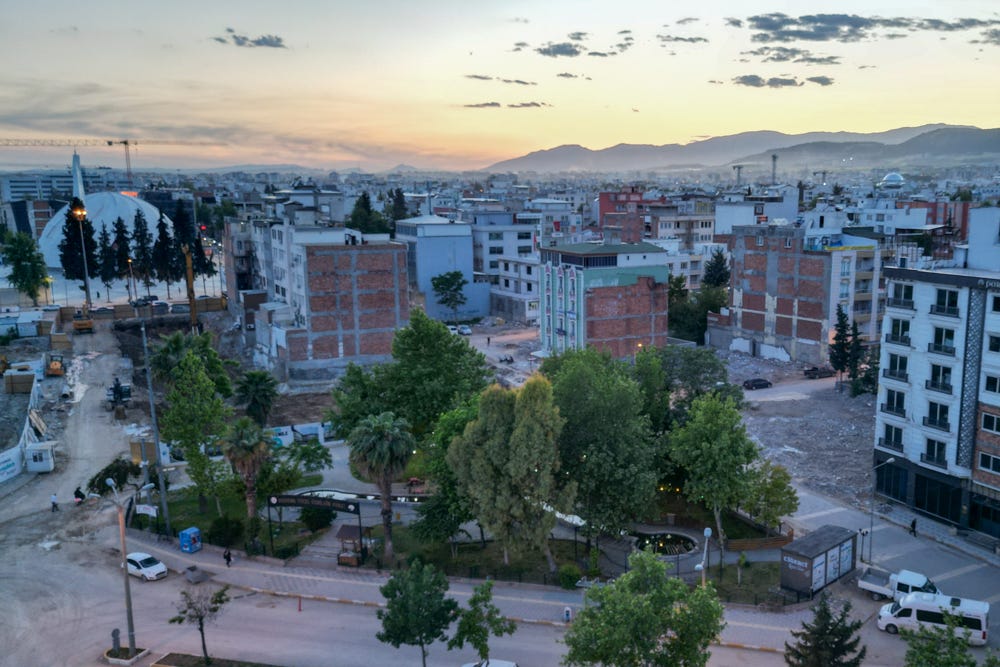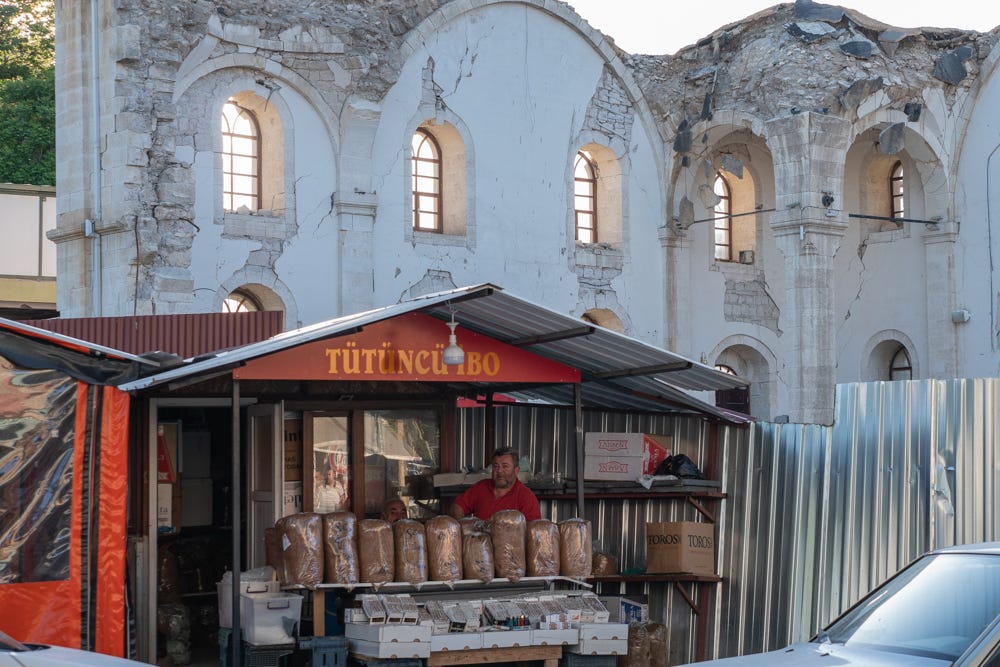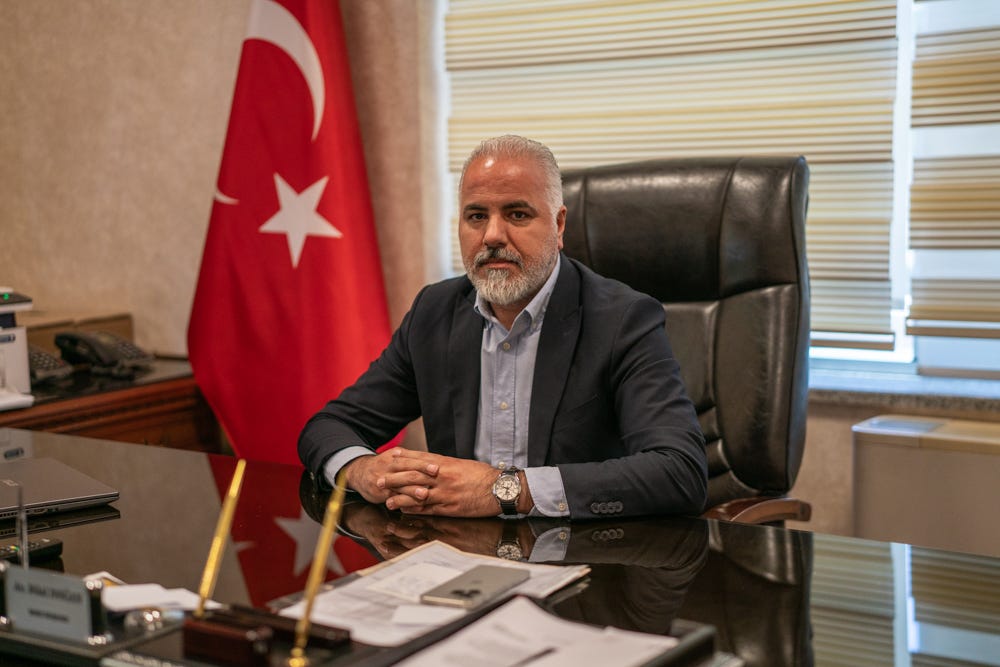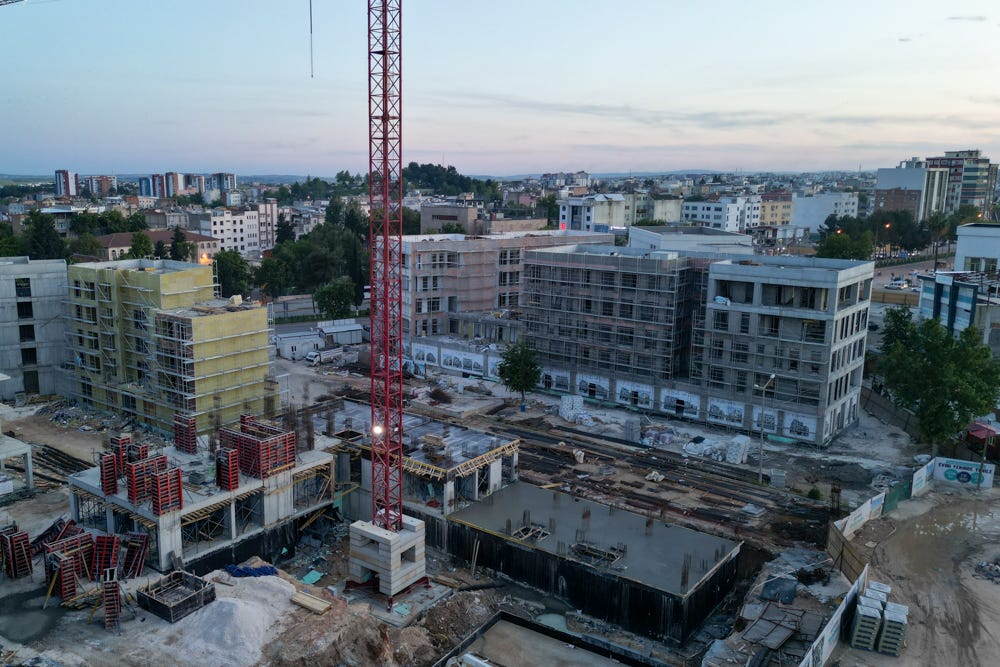Turkey recap recently visited three provinces in central Turkey to report on post-election developments in Anatolia. This is the second article in a series of three. Here’s our first report from Şanlıurfa.
ADIYAMAN – A little over a month after the local elections, the hallway leading to the office of Adıyaman’s new mayor, Abdurrahman Tutdere, was packed with residents who had come to visit him.
“The first thing we did after we got elected was to open the doors of the municipality to the people,” said Tutdere, of the Republican People’s Party (CHP).
Since the former municipality building collapsed, the mayor and other municipal workers had moved temporarily into the governor's office building.
From his working room, Tutdere can see piles of rubble, ongoing construction work and the giant jackhammers that shake his building on a daily basis. These are everyday reminders of the earthquakes that hit Adıyaman on Feb. 6, 2023 — not that Tutdere has forgotten.
“Since we experienced the earthquakes, our priorities are different,” Tutdere told Turkey recap, adding, “We first strive to rebuild infrastructure and superstructure, and we struggle with the heavy dust, rubble removing efforts for our city.”
According to Tutdere, employment is the major demand of the people in the city after accommodation. “Ninety-nine percent of the people who visit me also ask for a job for their children,” the new mayor said.
Prior to the March 31 elections, the CHP had last won an election in Adıyaman in 1977. The province’s historic flip from the governing Justice and Development Party (AKP) to the main opposition CHP was a delayed response to the lack of progress after the Feb. 6 earthquakes combined with general political trends across the country.
As the province’s sole opposition MP for the last two terms, Tutdere’s name recognition also helped steer many votes to CHP. In interviews with Turkey recap, his diverse supporters often cited Tutdere’s continued work and visibility after the twin quakes leveled large parts of the city.
With fresh momentum and a new mandate, Tutdere now believes his success at the polls can be repeated if his municipality can fulfill promises to rebuild the city and lead it as a democratic and pluralistic administration.
“This will change the perception of CHP [in the region] ... It’ll grow from Urfa to Malatya, Diyarbakır. This is our first and foremost responsibility,” Tutdere said.
Since its establishment in 2002, the AKP had been the leading party in Adıyaman. For more than 20 years, it controlled the Adıyaman municipality and won at least four of the province's five parliamentary seats.
In the presidential elections last year, Pres. Recep Tayyip Erdoğan received almost 70 percent of the votes in Adıyaman and his party collected more than half of the votes in the May 2023 general elections.
The previous AKP mayor of Adıyaman, Süleyman Kılıç, was elected with 53 percent of votes in the 2019 local elections. That year, Tutdere's party, CHP, had no candidates and supported Ahmet Faruk Ünsal, Saadet’s candidate for mayor. With support from CHP and the pro-Kurdish Peoples’ Democratic Party (HDP), Ünsal got 28 percent of the votes.
In comparison, Tutdere was elected with 49.74 percent of the votes this spring. His main rival, AKP's Ziya Polat, received 27 percent of the votes.
Anatomy of a fall
Making sense of the electoral change, Ünsal, a former AKP MP from the city and a known human rights activist with a conservative background, said the 2023 general elections were held shortly after the earthquakes, when many Adıyaman residents were still in shock.
“They thought that the AK Party would be able to handle this burden and fix their problems," Ünsal told Turkey recap. “That's why we didn't see this big dramatic effect in the last elections, but when more than a year passed and nothing changed, people could not make new excuses for the AK Party – they were either incompetent or did not care enough.”
Third party candidates were another factor. When Ünsal ran back in 2019, İYİ Party received almost 12 percent of the votes. This year, the İYİ Party vote share fell to 0.8 percent.
“İYİ Party collapsed in the eyes of voters, almost all of their votes went to Tutdere,” Ünsal said, also claiming the pro-Kurdish DEM Party de-facto supported CHP by nominating a “weak” candidate.
Next to national and local politics, another important reason for AKP’s loss was their stance on Gaza, Ünsal claimed.
“Adıyaman is a relatively conservative place,” he explained. “Even though the AK Party denied it, the voters saw that trade [with Israel] was continuing, and it created a backlash. AK Party voters with high religious sensitivity saw the New Welfare Party as the most suitable alternative.”
The Islamist New Welfare Party (YRP) got 13 percent of the votes in Adıyaman, compared to 6 percent nationwide.
“Of course, Tutdere’s work in Adıyaman helped him win,” Ünsal concluded. “Yet, without the vote transfer from AKP or to CHP, and without the Gaza conflict, it wouldn’t have been possible for him to win even if he spent all 365 days of the year in Adıyaman.”
For years, Serpil Çevik had supported AKP candidates, but this time she voted for Tutdere. While speaking, she called him “Başkanım”, meaning “my mayor”. Çevik lost four relatives from her immediate family and works in one of the few re-opened hotels in Adıyaman.
“Adıyaman was left all alone,” she said, adding she believed Tutdere could bring change.
In contrast to many local voters, Çevik said she was also frustrated with the president. In her opinion, Erdoğan should visit Adıyaman and hear the criticism against his party and the reasons people switched their votes to CHP.
“I’m really angry because of this,” she said. “Why did Tayyip Erdoğan as the president not come [to Adıyaman] and meet with the people?”
Two months after the vote, Çevik said she was satisfied with Tutdere's performance.
“I can see how active he is,” she told Turkey recap. “For example, there was a water shortage in one of the container camps, and he was there. He waited with the people until midnight for hours until the problem was fixed. We need this.”
Nothing left to fear
In a coffee house in the center of Adıyaman, a group of younger residents were also keen to explain their perspectives. Most were in their early 20s, though some were younger.
When asked who among them had never voted for CHP, a dozen hands shot in the air. Regardless, most spoke highly of Tutdere, especially regarding his post-earthquake efforts.
“He defended the corpses of our loved ones and the ruins of our buildings,” said Can Coşkun, a student preparing for upcoming college entrance exams.
“I haven’t seen [people from] other political parties here. No one from the current government was here. At least Tutdere was with us,” Coşkun continued, negating previous provincial visits by Erdoğan and other AKP members.
In the cafe, the magnitude of the loss of life was visible on a wall dedicated to ‘earthquake martyrs’. Dozens of pictures hung representing even more deaths, as the owner explained it did not feel appropriate to hang pictures of women in a coffee house mostly visited by men.
The youth here were from different political backgrounds: the father of one was active within the AKP, others got into a heated discussion about Kurdish political parties. Many of them criticized the CHP administration, but they also saw Tutdere in a different light.
“We didn’t think about left or right when we voted for Tutdere,” Coşkun said. “I consider myself as an Ülkücü [member of a nationalist far-right youth group] and have been voting for MHP until now, but I voted for Tutdere this time because I voted for the person, not for the party.”
When asked if they feared voting for an opposition candidate might have negative impacts on the recovery process, as Erdoğan warned in Hatay, Yüksel Gökdemir replied:
“So many people died, we saw so many corpses that we had nothing left to fear.”
Knocking On TOKİ’s Door
Adıyaman Gov. Osman Varol announced on the first anniversary of the earthquakes, that 8,387 people had died, and 17,499 were injured in the province as a result of the event.
In addition, 33,112 buildings in the city were determined either collapsed, in urgent need of demolition, severely damaged or moderately damaged. Officials estimate 52,000-55,000 people in Adıyaman are currently living in container camps.
Bilal Doğan, the head of the Adıyaman Bar Association, told Turkey recap that his association handles thousands of legal cases in a city where more than 1,900 buildings immediately collapsed after the twin earthquakes.
He said the public still expects the stricter enforcement of building codes and more penalties for violating construction standards, but the current workload on the courts, the insufficiency of the expert reports and inadequate legislative regulations stall most legal processes.
In addition to ongoing court battles, Adıyaman residents also face uncertainty on their property rights and housing options.
“I had an office there,” said Doğan, pointing out the window from his workspace in the Adıyaman courthouse. “Now it is in the reserve area, and we don’t know what we’ll get when the construction is finished,” he continued.
The government passed a regulation in November to create “reserve building areas”. The aim was to expedite reconstruction in earthquake-hit cities. Even though the regulation said that those affected would be entitled to a property after paying the construction costs, details of the financial burden are still unclear.
A similar uncertainty applies to TOKİ housing. Erdoğan attended a ceremony for TOKİ houses in Adıyaman in February, when he handed over the keys of almost 3,000 apartments to citizens and promised that number would increase to 29,000 before the end of the year.
Doğan was one of those fortunate enough to receive a TOKİ house, even though he didn’t apply for one. His neighbors’ application automatically made him a candidate, and his keys were unexpectedly delivered to him.
Yet he said the house was not ready for occupation and he plans to give the keys back.
“The ceremony was on Feb. 8, and I decided to check [the apartment] around the end of March. But it wasn’t in a livable condition back then. Now, we can live in it but there are other troubles,” Doğan said, citing a lack of infrastructure, transportation and security problems around the new TOKİ complexes.
According to Doğan and other citizens, people who received TOKİ houses still don’t know how much they’ll pay for them.
“We sign a blank paper to get housing,” many told Turkey recap.
TOKİ officials said this was the responsibility of AFAD, while AFAD told Turkey recap they do not have information about this specific claim. Additionally, an official told Turkey recap prices differ between cities, and locations within the city, depending on building costs.
The uncertainty led Doğan to conclude the ruling party couldn’t manage the situation after the earthquake and took Adıyaman for granted.
“They were sure people would vote for them regardless of whether they provided public services or not. But this election showed them that it was not the case,” he said.
“It is a big opportunity for Adıyaman,” Doğan continued. “If the government makes efforts to win this place again and the opposition fights for what they have won, it will help the recovery of Adıyaman.”
Though both the mental and physical recovery are far from complete.
Tutdere said both are among his main challenges as mayor, adding he believed at least 2 to 2.5 more years were needed to restore some sense of normalcy. Solidarity and support from other CHP municipalities like İstanbul, Ankara and İzmir remain crucial in the process, he said.
“We have strong relations with CHP’s metropolitan municipalities and their mayors. We will get support from them,” Tutdere said. “Because without their support and contributions, we have no chance of accomplishing these tasks on our own with the municipal budget in Adıyaman."
This newsletter is supported by readers via Substack and Patreon. Paid subscribers get full access to our recaps, reports, members-only Slack and news tracking tools. All proceeds go towards sustaining our journalism.
Turkey recap is produced by the Kolektif Medya Derneği, an İstanbul-based non-profit association founded by our editorial team to support and elevate news media and journalists in Turkey. Contact us: info@turkeyrecap.com
Diego Cupolo, Editor-in-chief @diegocupolo
Gonca Tokyol, Editor-at-large @goncatokyol
Ingrid Woudwijk, Managing editor @deingrid
Verda Uyar, Digital growth manager @verdauyar
Emily Johnson, Deputy editor @emilyjohnson
Damla Uğantaş, Tr Türkçe editor @damlaugantas

